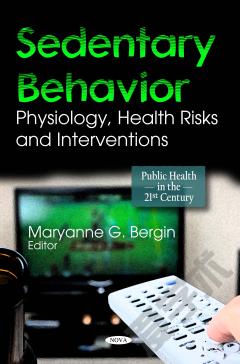Sedentary Lifestyle: Predictive Factors, Health Risks and Physiological Implications
The health risks associated with a sedentary lifestyle and lack of physical activity have become the main concern for health professionals, clinicians and scientists in the 21st century. This book presents readers with a comprehensive examination of the most recent scientific evidence explaining the deteriorating health consequences of sedentary behaviour and physical inactivity across the human lifespan. It also provides novel and effective intervention strategies, primarily those based on physical activity in order to reverse and reduce these health risks, particularly risks related to the metabolism and cardiovascular disease. Empirical research findings and innovative scientific models for physical activity and exercise interventions are presented throughout the book based on well-designed research studies by leading authors and practitioners. Readers can also benefit from both scientific and practical recommendations for prescribing physical activity and exercise to address the health risks associated with: sedentary lifestyle and potential benefits for diabetes, epicardial adipose tissues, muscle and joint function mechanics, metabolic and cardiovascular risk prevention. The book also highlights the latest age- and population-specific recommendations for screening and planning effective physical activity, as well as exercise interventions for children, adolescents, older adults and other sedentary individual groups such as sedentary workplace employees and individuals with diabetes. Health benefits are discussed at different complexities of the human body. Nine chapters within this book cover the health risks and adaptive responses to physical activity and exercise at the molecular, cellular, muscular, adipose tissue, metabolic, cardiovascular, and multi-compartment levels of the human body. The book offers excellent scientific insight and practical recommendations for readers across the globe.
{{comment.content}}








 京公网安备 11010802027623号
京公网安备 11010802027623号